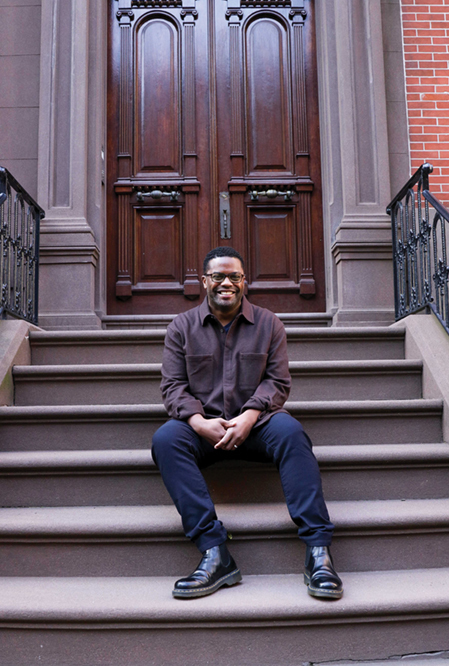
Chris Cassidy
Harrison David Rivers has written a new play, “The Salvagers,” about families, people, and the things they leave behind.
View full image

Chris Cassidy
Harrison David Rivers has written a new play, “The Salvagers,” about families, people, and the things they leave behind.
View full image
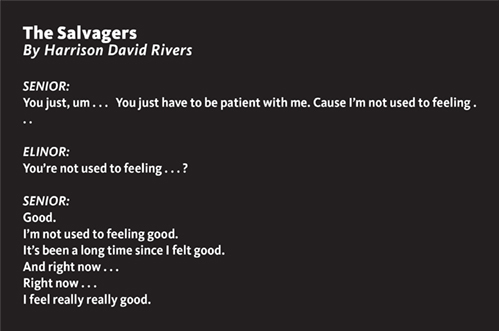

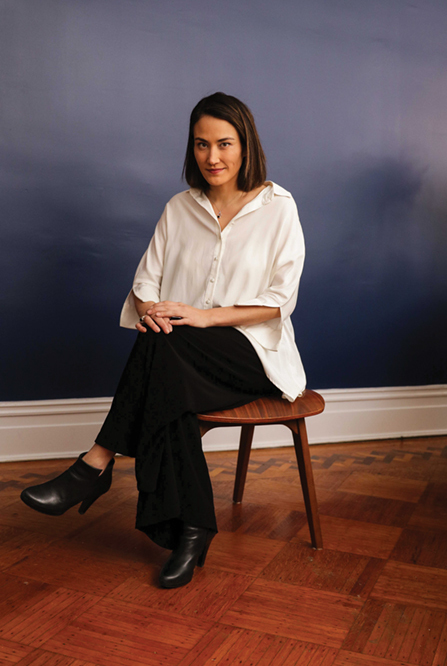
Chris Cassidy
Susan Soon He Stanton’s play “Today Is My Birthday” shows characters conversing—or trying to converse—on almost every kind of modern audio. They just don’t seem to talk in person.
View full image

Chris Cassidy
Susan Soon He Stanton’s play “Today Is My Birthday” shows characters conversing—or trying to converse—on almost every kind of modern audio. They just don’t seem to talk in person.
View full image
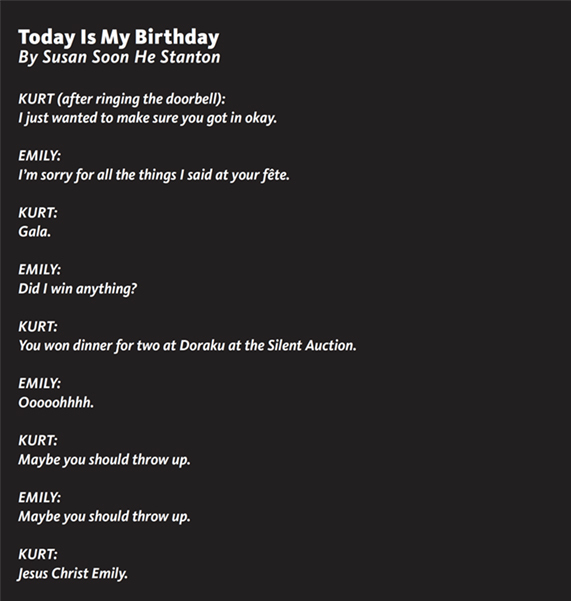

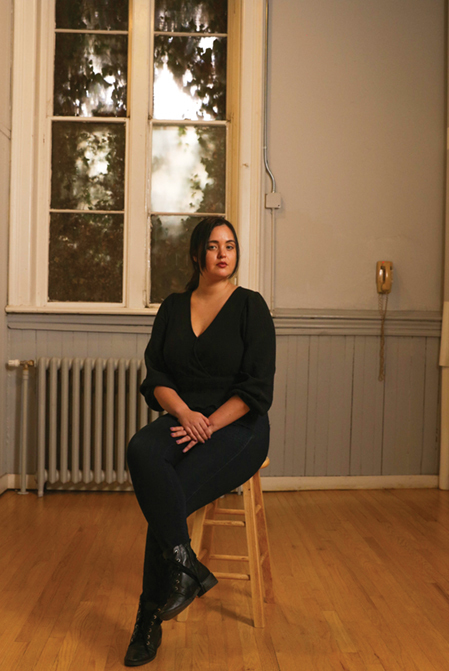
Chris Cassidy
Thanks to the Binger Center, Leah Nanako Winkler was able to travel to Kentucky to meet people living in the community where she wanted to set her play “The Brightest Thing in the World.”
View full image

Chris Cassidy
Thanks to the Binger Center, Leah Nanako Winkler was able to travel to Kentucky to meet people living in the community where she wanted to set her play “The Brightest Thing in the World.”
View full image
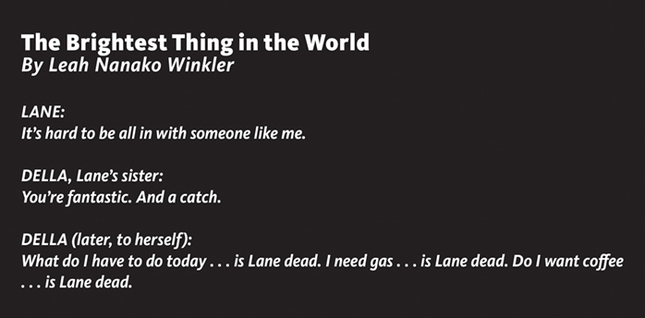

Most artists, no matter the medium, want the same things: time for creating their art and an audience to experience the results. Not that the two typically come hand in hand. A grant that provides a year off to paint doesn’t include a gallery for showing the works. The friend with the lovely unused room isn’t offering a book contract.
But every year, a few very talented playwrights receive a well-deserved honor from the Yale Repertory Theatre—specifically, from the Rep’s Binger Center for New Theatre which offers an ideal all-in-one package: a commission for new work, development resources, and the possibility (though not the guarantee) of an onstage production—perhaps at the Rep, perhaps somewhere else. “Those are the three main buckets the money is in,” says Amy Boratko ’06MFA, Yale Rep’s senior artistic producer.
So please, open your Playbill to the three-act drama that is the Binger Center’s raison d’être.
Act I: Commission
The scene opens with a phone call: Jennifer Kiger, director of the center’s New Play Programs, dialing the first of four playwrights who will be offered a commission from the Yale Rep. “Those are fun phone calls to make,” says Kiger. “It’s the best part of our job.”
Despite its name, the Binger Center isn’t a physical place, but a program within the Yale Rep—itself part of Yale’s David Geffen School of Drama. A new plays program began in 2008; in 2012, the Robina Foundation, along with a few other foundations and donors, fully endowed an effort that was named after Robina’s founder, the late philanthropist James Binger ’38. As of 2023, the center has supported over 60 commissioned artists and funded over 30 new plays and musicals.
A lot of behind-the-scenes work leads to that phone call. Boratko and Kiger read and scout plays, with the help of two dozen other readers. Theater colleagues, in-house and out-of-house, suggest names for an evolving list of promising writers. (Playwrights can’t apply for a commission, but some who submit work to the Rep for production may get lucky.)
And what determines who gets picked?
Kiger describes herself as reading for “voice and possibility.” Boratko reads for the same but adds, “I’m also reading for theatricality, for a story that really wants to be onstage and doesn’t want to be in any other form.”
James Bundy ’95MFA, dean of the drama school, most values writing that “inspires joy, empathy, and understanding.” He says the season planning group “recognizes that it’s important to bring into our community a broad array of storytelling from disparate cultural backgrounds.” The Binger Center means to support playwrights throughout their careers. “We aren’t always commissioning the newest playwrights,” says Boratko. “We think about sustaining people. Maybe we could give artists who have an established career a commission that allows them to experiment.”
Of his own 2018 commission, Harrison David Rivers says: “You cannot underestimate the encouraging power of a phone call out of the blue, about conversations that have been happening between people that you didn’t know were having conversations about you—especially when it’s an organization offering you money.” Given that self-doubt likes to Velcro itself to the artistic process, a prestigious theater’s offer of about $25,000 (a top sum for not-for-profit theater commissions) is eminently validating, and allows ideally sufficient time for a writer to create a play.
Act II: Development
Once commissioned, Binger artists are free to write whatever they want to write, on the schedule they want. “There are playwrights we commissioned ten years ago who are still working on their draft,” admits Boratko. “So it’s always a leap of faith, but everybody takes the time they need.”
For the two dozen–plus commissions currently in the writing stage, Boratko and Kiger—along with others in the Rep’s artistic office—read drafts and arrange readings, workshops, short New Haven residencies, and access to dramaturgs or other resources. If a commissioned artist comes to the campus for research, the Binger Center does the legwork and provides an itinerary: You can show up at Beinecke at this hour and speak to so-and-so about such-and-such. You can go to Sterling at that hour to find [blank].
Commissioned playwright Susan Soon He Stanton ’10MFA visited New Haven twice to research a story about the whaling industry, missionaries, and her native Hawaii.
The possible narrative involves a convert to Christianity, with Yale ties, who helped repatriate Hawaiian boys who had been hoodwinked into signing on to whaling ships.
Of her subject, Stanton says: “There are so many churches when you walk around New Haven. All these different layers of sediment. And Hawaii is also a place where there have been many different waves of immigration and religious reform and different movements that lay on top of the place. I’m interested in trying to figure out what that landscape looks like. And, because the Rep is itself formerly a church, there’s something about all of that that I’m interested in.”
The Binger Center is by no means a program that feeds only its own. However, Stanton graduated from the David Geffen School of Drama, and plenty of commissioned playwrights—as well as directors, actors, designers, and others who will eventually work on a commissioned project—have Yale ties. No surprise, given the talents (current and future) of those who enroll in the drama school. Stanton herself has won numerous awards, including an Emmy for her work as supervising producer for HBO’s Succession. And even if a commissioned artist doesn’t already have an association with Yale, an association may develop; 2016 MacArthur fellow Branden Jacobs-Jenkins has had two Binger commissions and is now on the Yale faculty.
In the spring of 2022, Harrison David Rivers turned in his commissioned script, The Salvagers, a play about what we inherit from our fathers whether we want it or not. A Zoom workshop followed, and then, in October 2022, an in-person reading in New York. Harrison had another play opening at New York’s Roundabout Theatre that month, so the reading was cast with New York actors, directed by Tamilla Woodard ’02MFA—resident director at the Yale Repertory Theatre—and attended by a few staff members.
Harrison found the two-day session thrilling, a chance to really interrogate his script, rewrite scenes on the fly, try new things, and cut others. “You can only hear it in your head for so long,” he notes. Now he wants to see the piece not just read, but acted, in order “to get a sense of the physicality of the piece. I feel like I’ve done what I can do without bodies in motion. Hopefully, that’s the next step.”
Intermission
Yale’s season is currently limited to four plays, so when the Rep can’t stage a play it admires, Binger dips into its “enhancement funds” for a production elsewhere.
“It’s always been risky and expensive to produce new plays, and it costs exponentially more right now,” says Kiger. “Inflation, supply-chain demands. It affects theaters in ways that people don’t think about. Lumber costs more, steel costs more, trucking and gasoline and the time to get materials to build a set costs more. We’ve also lost labor. We lose really gifted artists to television and film, and we always have, but now we’re not just losing the artists—we’re losing managers and technicians.”
Binger contributed money so that Dorothy Fortenberry’s ’08MFA The Lotus Paradox, a play about a successful children’s book author that also grapples with climate change, could be produced at South Carolina’s Warehouse Theatre. (Like Stanton, Fortenberry also now works in TV, having served as producer and writer for Hulu’s The Handmaid’s Tale.) Though Binger by no means financed the whole of the 2022 production, they were able, Boratko says, “to give Warehouse Theatre a little bit of a boost just to help it fulfill its highest standards.”
The Binger Center may also support commissioned artists for plays unrelated to the commission, as is the case with the play that will close the Rep’s 2022–2023 season: Christina Anderson ’11MFA’s the ripple, the wave that carried me home. The play is about a woman whose activist parents fought to integrate the swimming pools in their Midwest community. Bringing the talents of a commissioned artist back to the Rep stage is a way the grant that benefits the playwright also benefits New Haven audiences.
Act III: Production
Leah Nanako Winkler’s The Brightest Thing in the World opened second (after Who’s Afraid of Virginia Woolf?) in Yale’s 2022–2023 season. When Binger commissioned Winkler, Kiger says, that play “wasn’t an idea yet in her head.” But Kiger had been impressed by the people Winkler wrote about.
Winkler had been raised in Japan and Kentucky, and her domestic dramas use aspects of her personal history and community experience to engage with class, identity, and race. For Boratko, The Brightest Thing offers theatricality—not by being fully realistic, but by being structured to suggest “how memory works and how love works and how we hold the people we love.”
Winkler was surprised by her commission. True, her plays are widely performed, and just before the offer, she won the Yale Drama Series competition (run not by the drama school but by Yale University Press) for her play God Said This, which concerns a mixed-race family in Lexington, Kentucky, negotiating their differences while the mother weathers chemo treatments. Winkler had also written a play that poked fun at Ivy League culture. One character constantly brags that he went to Yale.
The commission came at a time when Winkler had three roommates, so she visited New Haven for writing getaways. She also used some of the funds for a trip to interview people in the Kentucky community where The Brightest Thing is set. The play opens with two women bantering and flirting their way to a romantic relationship, but expands to reveal the characters’ considerable complications. Ultimately, it’s a story about addiction and grief.
As they did with Rivers’s play, Boratko and Kiger arranged for a Zoom workshop and then an in-person reading. They knew when the play was ready to be recommended to the season planning group, and the group scheduled the play into the 2022–2023 season. The New York Times agreed on the play’s merits, calling last December’s production “a potent new play . . . acknowledging the messy, scary coexistence of joy and pain, strength and fragility, self-preservation and self-destruction.”
Applause
The Robina Foundation wanted its gift to the Yale Rep to be “transformative for the institution and for society at large,” says Kathleen Blatz, former board chair of the foundation.
It would be hard not to feel that the foundation’s wishes were granted. Binger’s web page is a who’s who of groundbreaking American playwrights, names that have gone on to critical accolades and major awards. But those plaudits aren’t exactly the point. The point is for the Rep to produce consequential new work that then goes on to a robust life, on Broadway or elsewhere, as with Paula Vogel’s Indecent and Will Eno’s The Realistic Joneses. The aim is to “feed the ecosystem” of American theater, says Steven Padla, communications director for the Yale Rep and the drama school.
“In some respects,” says James Bundy, “we have a happy obligation to adopt a different risk profile from our peer theaters around the country, because we aren’t dependent on box office revenues. We’re giving writers opportunities to do things they might not yet have had a chance to do. And when they’re successful, this leads to the creation of production of plays that demonstrably move the needle for progress in the field.”
As for the 46 Binger plays that have been completed and the 26 that have been produced: would they have come into the world if not for Yale’s funding? What about the 18 in progress? Harrison David Rivers says: “The commission allows you to push some things that you’ve been sitting on to the forefront, and it gives you the time to fail at them, and then find your way back to them. That’s a gift. I imagine I would have written the play anyway. It just might have taken me ten years.”
But instead, says Rivers, when he got the Binger commission he could think: “Now, I get to do it tomorrow.”
 loading
loading